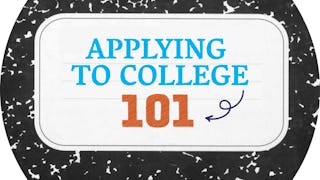- Browse
- Greek Mythology
Results for "greek mythology"
 Status: Free TrialFree TrialU
Status: Free TrialFree TrialUUniversity of California San Diego
Skills you'll gain: Ideation, Interaction Design, Prototyping, A/B Testing, User Experience Design, Usability Testing, User Interface and User Experience (UI/UX) Design, Design Thinking, Human Centered Design, Usability, Mockups, Design Research, User Research, Innovation, Creativity
4.5·Rating, 4.5 out of 5 stars163 reviewsMixed · Course · 1 - 3 Months
 Status: Free TrialFree TrialM
Status: Free TrialFree TrialMMicrosoft
Skills you'll gain: Power BI, Dashboard, Microsoft Power Platform, Data Visualization, Data Integration, Business Intelligence, Performance Analysis, Data Security, Microsoft Teams, Data Analysis Software, No-Code Development, Customer Engagement
4.4·Rating, 4.4 out of 5 stars45 reviewsBeginner · Course · 1 - 4 Weeks
 Status: FreeFreeU
Status: FreeFreeUUniversity of Pennsylvania
Skills you'll gain: Organizational Skills, Student Support and Services, Higher Education, Planning, Prioritization, Self-Awareness, Decision Making, Personal Development, Resourcefulness, Goal Setting, Research
4.8·Rating, 4.8 out of 5 stars16 reviewsBeginner · Course · 1 - 3 Months
 Status: Free TrialFree TrialW
Status: Free TrialFree TrialWWesleyan University
Skills you'll gain: Data Storytelling, Exploratory Data Analysis, Data Analysis, Data Visualization, Analytical Skills, Report Writing, Data Science, Data Management, Big Data, Statistical Analysis, Real Time Data, Research, Research Design
4.7·Rating, 4.7 out of 5 stars47 reviewsMixed · Course · 1 - 4 Weeks
 A
AAmazon Web Services
Skills you'll gain: Infrastructure as Code (IaC), AWS CloudFormation, Scripting, Bash (Scripting Language), Amazon Web Services, Command-Line Interface, Configuration Management, Amazon Elastic Compute Cloud, Automation, Shell Script, Continuous Monitoring, Cloud Management, Continuous Integration, Patch Management, Software Testing
4.6·Rating, 4.6 out of 5 stars79 reviewsBeginner · Course · 1 - 4 Weeks
 Status: Free TrialFree TrialA
Status: Free TrialFree TrialAArizona State University
Skills you'll gain: English Language, Marketing Materials, Business Planning, Management Reporting, Business Writing, Marketing Planning, Business Correspondence, Project Documentation, Financial Analysis, Budgeting, Business Communication, Presentations, Business Reporting
4.4·Rating, 4.4 out of 5 stars39 reviewsIntermediate · Course · 1 - 3 Months
 Status: Free TrialFree Trial
Status: Free TrialFree TrialSkills you'll gain: Professional Networking, Interviewing Skills, Technical Support, Technical Support and Services, Professional Development, Desktop Support, System Support, Help Desk Support, Professionalism, Technical Communication, Verbal Communication Skills, Problem Solving, Communication
4.9·Rating, 4.9 out of 5 stars138 reviewsMixed · Course · 1 - 4 Weeks
 Status: Free TrialFree TrialU
Status: Free TrialFree TrialUUniversity of Colorado Boulder
Skills you'll gain: Semiconductors, Electronic Components, Electrical Engineering, Electrical and Computer Engineering, Electronics, Electronics Engineering
Build toward a degree
4.2·Rating, 4.2 out of 5 stars89 reviewsAdvanced · Course · 1 - 4 Weeks
 Status: Free TrialFree Trial
Status: Free TrialFree TrialSkills you'll gain: Microsoft Azure, Cloud Applications, Cloud Deployment, Continuous Deployment, Application Deployment, ASP.NET, Platform As A Service (PaaS), Development Environment, Containerization, Docker (Software), Web Applications, Microsoft Visual Studio, Integrated Development Environments, Scalability
Intermediate · Course · 1 - 3 Months
 Status: Free TrialFree TrialU
Status: Free TrialFree TrialUUniversity of Michigan
Skills you'll gain: Constructive Feedback, Decision Making, Peer Review, Personal Development, Cooperation, Self-Awareness, Critical Thinking, Performance Review, Leadership, Adaptability, Positivity, Creativity, Communication, People Management
4.7·Rating, 4.7 out of 5 stars68 reviewsBeginner · Course · 1 - 4 Weeks
 Status: NewNewStatus: FreeFreeT
Status: NewNewStatus: FreeFreeTThe University of Edinburgh
Skills you'll gain: Cultural Diversity, Climate Change Programs, Interactive Learning, Creativity
Beginner · Course · 1 - 4 Weeks
 Status: PreviewPreview
Status: PreviewPreviewSkills you'll gain: Multimedia, Education Software and Technology, Developing Training Materials, Finance, Presentations, Video Editing, Video Production, Generative AI, Content Creation
Beginner · Course · 1 - 4 Weeks
Searches related to greek mythology
In summary, here are 10 of our most popular greek mythology courses
- Interaction Design Capstone Project: University of California San Diego
- Power BI & Power Virtual Agents: Microsoft
- Applying to College 101: University of Pennsylvania
- Data Analysis and Interpretation Capstone: Wesleyan University
- Automation in the AWS Cloud: Amazon Web Services
- Business English: Final Project: Arizona State University
- Tech Support Career Guide and Interview Preparation: IBM
- Transistor - Field Effect Transistor and Bipolar Junction Transistor: University of Colorado Boulder
- Launch a Website to Azure with Azure App Service: Microsoft
- Feedback Loops: Feedback Fundamentals : University of Michigan










